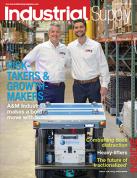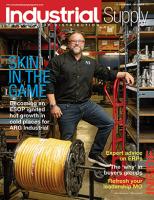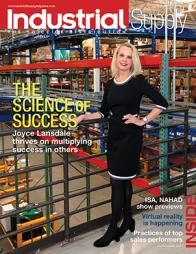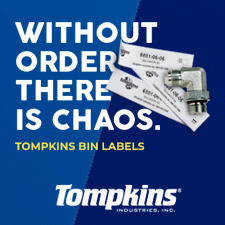Lean lessons
Lean Thinking helps you strip away non-essential processes and wasteful activities so you can focus on the core value-added service your customers really want.
By Howard W. Coleman, MCA Associates
During this current economic turbulence, companies need to reduce operational costs but still be able to develop new competitive advantages. That's why more companies are embracing the concept of Lean Thinking, which was first popularized by Toyota in that company's efforts to streamline its internal operations so it could focus on those activities that added the most value to customers.
The concept of Lean Thinking and its related methodologies (sometimes simply called “Continuous Improvement”) is now making its way to non-manufacturing organizations such as electrical distributors. It offers them opportunities for significant breakthroughs in reducing wasteful activities and unnecessary processes in all aspects of operations. The Lean concept is not meant to be a one-time event or just applied during bad times. To reap its benefits, distributors must be committed to a process of continuous improvement. The savings are real. In working with distributors over the years, I have found more than 60 percent of the activities they performed add no real value to the customer. Here are some things I have discovered:
- Cultural change and differences in mindsets often quickly become major points of discussion.
- Distributors too often just treat the symptoms of a problem rather than its root cause.
- Pre-conceived notions and assumptions about the causes of problems are sometimes difficult to dispel.
- Distributors' managers are often reluctant to have all employees involved in improvement activities on an ongoing basis. They are at times unwilling to give employees this power, which can suffocate team play.
For distributors, Lean Thinking means increasing productivity and through-put by decreasing the time it takes to do things, reducing errors, inventories, space needs and transaction costs. With the Lean concept, distributors can accomplish this with very little capital cost and the same or less head count. Distributors need to look at the value they add to customers and the wastes incurred in providing that value. The value a distributor provides to a customer is somewhat different than what a manufacturer provides to its customers.
A distributor typically adds no specific value to a product unless there is some activity, modification or special transaction the customer requests in addition to receiving a quality product on time. Distributors ultimately want to expand their capacity to deliver the services with less effort and at a reduced cost. This hopefully translates to greater profitability and satisfied customers.
Lean Thinking is relatively new to distribution-based markets, in part because distribution management has been slow to understand its benefits. Many of the successes to-date in distribution have been with large companies that have reduced supply chain transactional costs and increased supply chain reliability. That's great, but the benefits of Lean Thinking can extend to any function within a company and to companies of any size. A good example is a mid-size distributor firm (a client of mine) that has extended its lean initiative beyond the company's original central distribution center and warehouse to focus on almost every other area of their company from quotations, order entry, customer service and product procurement — right through accounting to payables and receivables. They have made great strides in leaning their processes and have developed their own culture of continuous improvement. Their fostering of Lean Thinking teams whole-heartedly supported by their senior management has really been the key to their success so far.
The Lean Journey
The most successful companies view Lean Thinking as a process of continuous improvement, not a destination. They strive for operational excellence as a way to gain competitive advantage. They continually remove successive layers of waste just like one would peel an onion. In Lean-speak I call it the “Seven Wastes.” Here they are:
Overproducing
Doing work before it's needed or more than required. It does not improve efficiency, and in fact consumes resources and may lead to other subsequent wastes.
Waiting/delays
Waiting for people, product, equipment or information. It adds no value to the service or process. It only adds to the queue and the time necessary for work to be done.
Inappropriate processing
Overly complicated processes or having to recheck other people's work, re-entering information, etc.
Unnecessary inventory
It takes up space, ties up money, results in potential obsolescence and can become a safety and damage issue.
Unnecessary motion
Unnecessary leaning, climbing, bending, poor ergonomics, etc., are common examples, not only in warehouses, but in administrative offices, too.
Defects
Error-riddled work that needs to be redone or otherwise results in poor quality.
Unnecessary transport
Having to move product, paperwork, employees or information too far or past unnecessary obstacles.
I always urge clients to use these Seven Wastes as their starting points, regardless of what functional area they may happen to focus on. Companies should also focus their energies on the following activities:
Increasing value to the customer and eliminating waste
The truly lean company focuses on those areas where additional value can be derived by the customer, including but not limited to better overall service and more competitive pricing. They also look for ways to perform other value-added services without incrementally increasing costs.
Mapping value-streams
This identifies and strips wasteful steps out of a company's flow of information and materials.
Maximizing inventory and flow
You need to maximize your inventory turns so your stock provides maximum value to customers at a minimum cost to you. That means stocking the products your customers need at the optimal stocking levels — ideally, no more than what customers need. Your vendors will probably need to be part of this process.
Pursuing operational excellence
Admittedly, this is a broad goal, but it's meant to represent a mind-set and often requires a cultural reassessment for many companies. It includes continuous improvement efforts by every worker, every manager and collaboration with suppliers to reduce the waste and costs inherent in your product supply-chain activities.
Lean Thinking can and does work for distributors. One of my firm's clients, Granite City Electric, Quincy, Mass., successfully utilized Lean Thinking concepts to bring about some very significant improvements in the way they do things. For instance, they are enjoying upwards of 50 percent increases in productivity and through-put, error reduction and capacity utilization. They utilized teams of employees educated in Lean Thinking methods who worked with a facilitator to develop a structured and phased plan. The development of this plan of action was the major breakthrough that helped them achieve these results.
Lean does not mean little. It does not mean starving yourself of inventory, headcount, capital investments or investments in training. It's not a diet, but rather a change in eating habits to strengthen your company.
If you are interesting in learning more about Lean Thinking, contact the author and ask for his free “Four-Phase Process to A Successful Lean Thinking Initiative” and “Four-Step Problem Solving Process.”
Howard Coleman is the principal of MCA Associates, a management consulting firm since 1986. MCA works with wholesale distribution and manufacturing clients that are committed to seeking operational excellence. MCA Senior Consultants provide idea leadership and implement continuous improvement solutions focused on business process re-engineering, inventory and supply chain management, sales development and revenue generation, information systems and technology, organizational assessment and development, and succession planning.
Contact: hcoleman@mcaassociates.com or 203-732-0603. Visit www.mcaassociates.com.














